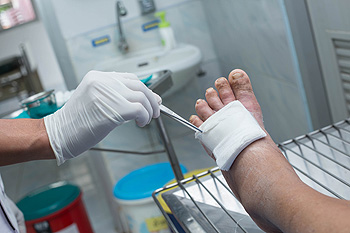 Diabetic patients tend to have a higher chance of developing foot conditions, most commonly, foot ulcers. A foot ulcer can be defined as an open sore that heals slowly. This condition typically affects a patient’s big toe, or the ball of the foot. Diabetic patients are more at risk for developing a foot ulcer for a variety of reasons, including nerve damage. Because nerve damage can cause a loss of feeling in the feet, diabetic patients may not always be aware if they have injured their feet or have developed a wound. If wounds are left untreated for too long, it is likely for an infection to develop, causing more severe foot damage. To help prevent wounds on the feet from causing serious harm, it’s suggested that if you are a diabetic patient, you check your feet on a daily basis for any abnormalities. For more information on wound care, please speak with a podiatrist for professional care.
Diabetic patients tend to have a higher chance of developing foot conditions, most commonly, foot ulcers. A foot ulcer can be defined as an open sore that heals slowly. This condition typically affects a patient’s big toe, or the ball of the foot. Diabetic patients are more at risk for developing a foot ulcer for a variety of reasons, including nerve damage. Because nerve damage can cause a loss of feeling in the feet, diabetic patients may not always be aware if they have injured their feet or have developed a wound. If wounds are left untreated for too long, it is likely for an infection to develop, causing more severe foot damage. To help prevent wounds on the feet from causing serious harm, it’s suggested that if you are a diabetic patient, you check your feet on a daily basis for any abnormalities. For more information on wound care, please speak with a podiatrist for professional care.
Wound care is an important part in dealing with diabetes. If you have diabetes and a foot wound or would like more information about wound care for diabetics, consult with one of our podiatrists from The Podiatry Center, PC. Our doctors will assess your condition and provide you with quality foot and ankle treatment.
What Is Wound Care?
Wound care is the practice of taking proper care of a wound. This can range from the smallest to the largest of wounds. While everyone can benefit from proper wound care, it is much more important for diabetics. Diabetics often suffer from poor blood circulation which causes wounds to heal much slower than they would in a non-diabetic.
What Is the Importance of Wound Care?
While it may not seem apparent with small ulcers on the foot, for diabetics, any size ulcer can become infected. Diabetics often also suffer from neuropathy, or nerve loss. This means they might not even feel when they have an ulcer on their foot. If the wound becomes severely infected, amputation may be necessary. Therefore, it is of the upmost importance to properly care for any and all foot wounds.
How to Care for Wounds
The best way to care for foot wounds is to prevent them. For diabetics, this means daily inspections of the feet for any signs of abnormalities or ulcers. It is also recommended to see a podiatrist several times a year for a foot inspection. If you do have an ulcer, run the wound under water to clear dirt from the wound; then apply antibiotic ointment to the wound and cover with a bandage. Bandages should be changed daily and keeping pressure off the wound is smart. It is advised to see a podiatrist, who can keep an eye on it.
If you have any questions, please feel free to contact our office located in Millburn, NJ. We offer the newest diagnostic and treatment technologies for all your foot care needs.
Read more about Wound Care